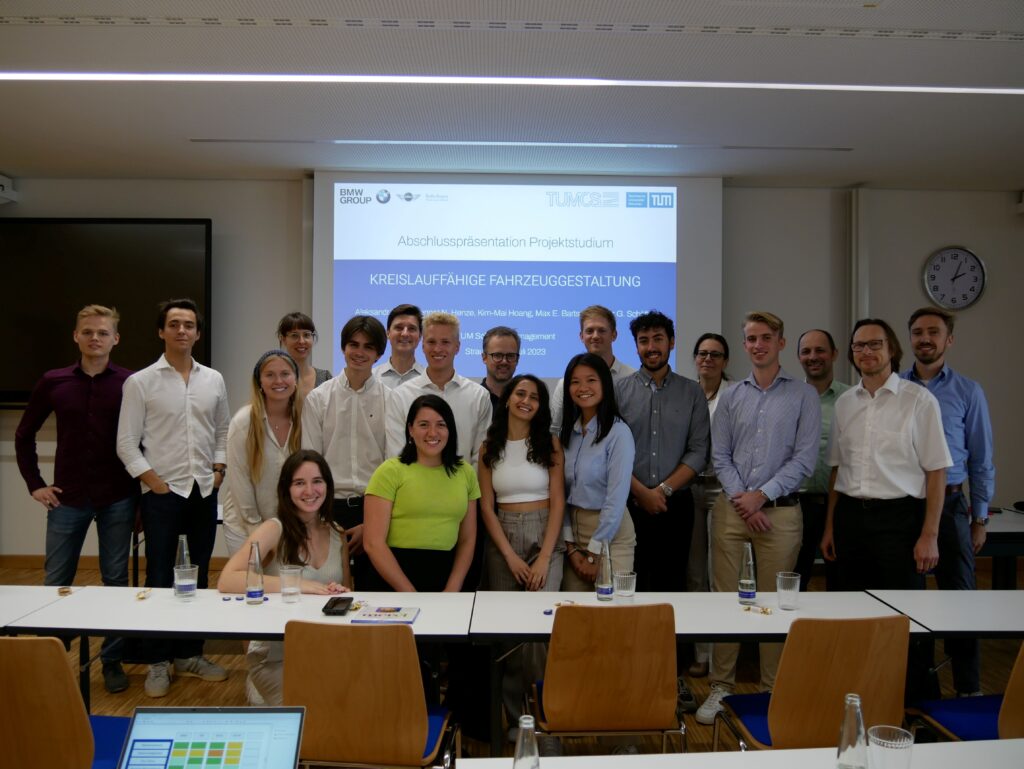In July 2023, two groups of students were able to successfully present their results, which they had developed during the project study in cooperation with BMW and which was supervised by the Chair of Circular Economy (Prof. Magnus Fröhling, Vanessa Heinrich). In the presence of an expert BMW jury, the research results could be discussed and critically reflected.
The project study group “KPI” aimed to identify suitable key figures that BMW can use in vehicle development as a requirement specification regarding Circular Economy.
This research project aims to evaluate suitable key performance indicators for BMW to apply in their product design/ development stage. BMW wants to improve the quality of the recycling output of their vehicles to enable high-quality secondary materials. Important criteria were the economic viability of the KPI calculations and taking the vehicle recycling status quo into account. The research group started by defining three prerequisites to consider in the design stage. These consist of a – material purity, b – material recyclability, and c – compound separability. The underlying logic is that all used materials themselves have to be pure and recyclable before they are attached to one another. If each pure, recyclable material can be separated and returned to its respective recycling stream, the recyclate can be of high quality. Literature reviews were performed to collect over 100 KPIs related to Design for Recyclability. As the results showed no fully suiting KPI for BMW, three new KPIs were developed that are tailored to the definition of a – material purity, b – material recyclability, and c – compound separability. These can be summarized as a fourth KPI, the overall circulability score. The project study provided valuable insights into scientific consulting for a large corporation and highlighted the challenges inherent in balancing scientific rigor with industrial pragmatism. It offered a valuable opportunity to translate research knowledge into actionable recommendations.
The second project study group “Electronics” dedicated their efforts towards developing a methodology for measuring semiconductors’ upstream scope 3 CO2e emissions. For this purpose, they collaborated with a BMW Group Research and Innovation Center department. One of BMW’s challenges regarding this topic was the absence of information regarding its suppliers’ operations. This transparency deficit posed a significant hindrance in measuring the scope 3 emissions of specific components, a problem exacerbated by the escalating prevalence of electronics, such as semiconductors and microcontrollers, in automobiles. The results underscored the importance of transitioning to a green electricity mix to substantially reduce emissions across node sizes and time. In summary, the challenges faced in measuring emissions illuminated the need for enhanced transparency within corporate supply chains. These difficulties showed the value of external expertise for companies aiming to reduce emissions, providing invaluable insights for the future. The complexity and time necessary to decrease opex-related emissions within a large corporation was an eye-opening revelation.
The students’ gratitude extends to the BMW partners Robert Martinez von Bülow, Elsa Davy, Sven Wittig, Klaus Vollmer, Bernardo Mota, and Pascal Frech for their guidance and invaluable feedback.
Project study group “KPI“: Aleksandr Birkle, Bennet N. Henze, Kim-Mai Hoang, Max E. Bartsch, Lorenz G. Schäffer
Project study group “Electronics”: Lena Stein, Emma Andrew, Charles Cozette, Paulina Hernandez, Rabia Sarilmis, Jona Rott

